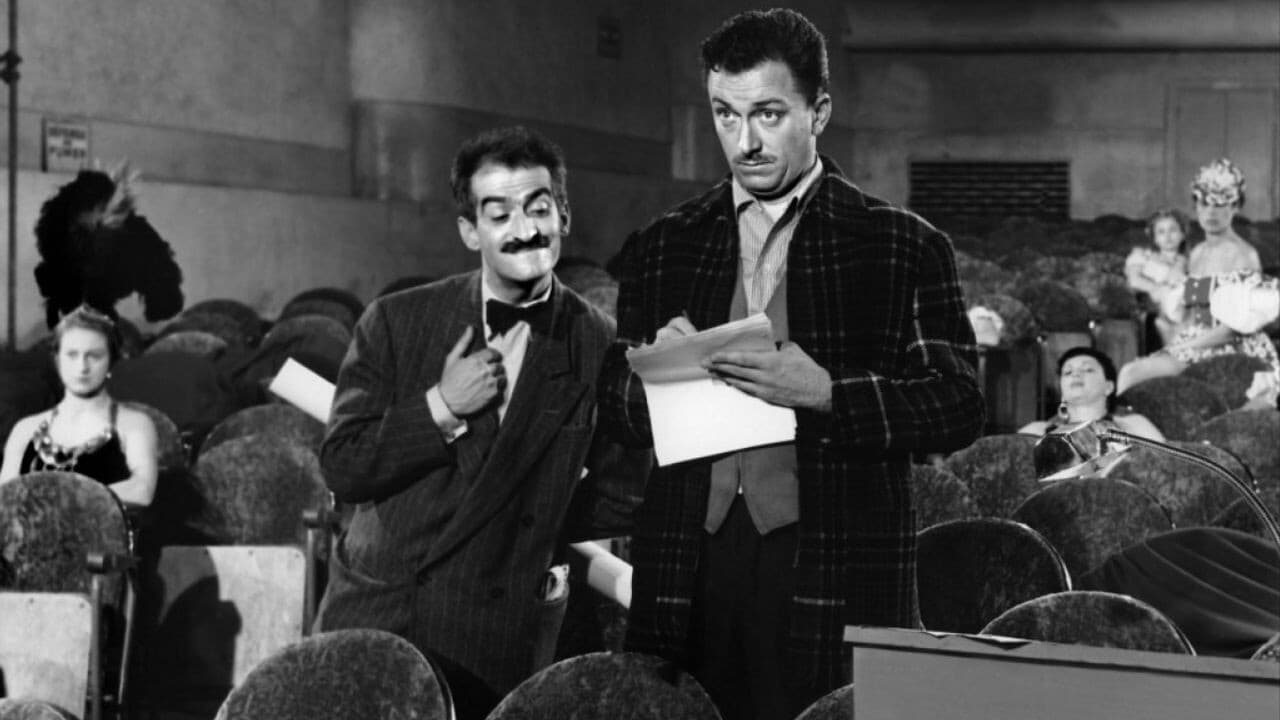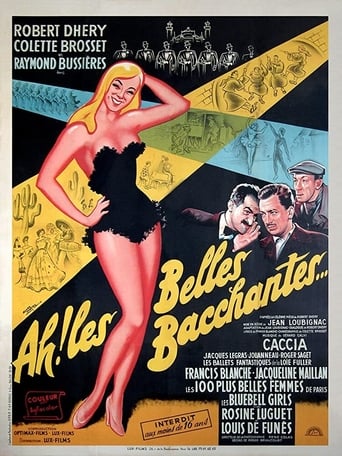Redwarmin
This movie is the proof that the world is becoming a sick and dumb place
Lightdeossk
Captivating movie !
Lidia Draper
Great example of an old-fashioned, pure-at-heart escapist event movie that doesn't pretend to be anything that it's not and has boat loads of fun being its own ludicrous self.
Sarita Rafferty
There are moments that feel comical, some horrific, and some downright inspiring but the tonal shifts hardly matter as the end results come to a film that's perfect for this time.
dlee2012
"Ah! Les Belles Bacchantes" (known in the English-speaking world as "Peek-a-Boo") is a fitfully amusing French farce about a police officer investigating a music hall revue and eventually becoming part of the troupe.Released in the same year as Renoir's "French Can Can" it is interesting to compare the two films. Certainly Renoir was more clearly emulating the Hollywood style of big budget musicals while this film is much more low key and far less ambitious. Nevertheless, it also gives a more realistic insight into the style of musical hall acts of the era. Free of the puritanical censorship employed in the Anglo-speaking world, many of the acts portrayed are genuinely amusing, albeit highly banal. The nudity is appropriate to the story and completely inoffensive and non- sexual and, indeed, makes for some amusing slapstick.Good use is made of the limited sets and the conceit of almost the entire film consisting of a rehearsal of the stage show is clever and works well. Indeed, the dialogue and story are weak and are really just a framing device for this string of "rehearsals" of acts. The moment when the character breaks the "fourth wall" at the end is especially delightful. In effect, the audience are doubly-distanced from the action in that we are watching a film of a rehearsal. Like the policeman, we are spying on the action that is not yet meant for public consumption. By breaking the fourth wall at the end, the performers tell us they were aware of our presence all along and that we have been welcomed to watch. Unlike the policeman, however, we are only observers and can never truly take part in the show. The best that can happen is the characters can address us directly but we cannot address them back. In this way, the film draws attention to one of cinema's great weaknesses compared to live performances: we are passive consumers, not participants on any level.In conclusion, despite the obvious budget limitations and workmanlike direction and cinematography, this is a genuinely delightful comedy that plays with notions of what is a real performance, what is a rehearsal and who are the audience and who are the participants. A true delight.NOTE: Many viewers may be confused about why the policeman character makes bizarre clucking sounds throughout the film. This is because the police are nicknamed "chickens" in France, just as they are derogatorily called "pigs" in England and Australia.
BryanLindop
This film appears to be aplauded by its own countrymen and derided by everyone else. I can only say, as an Englishman that I agree with my French counterparts! This film for me was a delightful surprise! It has to be viewed within the context in which it was made and anyone who thinks that the musical numbers are poor has really missed the point! The film captures in scenes of wonderfully absurd comedy, a rehearsal for a french revue in a second rate variety theatre. It was great fun to see Loius de Funes in an early supporting role, but I particularly like the whole feel of the film. At its most realistic, it really captures the feeling of being there in the theatre while chaos rules the rehearsal.Many of the pieces are hilariously funny, not least the bathing hut scene on the beach and the monks finale piece. For anyone who cringes at the nudity, I was delighted to find it all left in, realistically and is it should be! Also nice to see Agfacolour, though I have to confess that the print I saw was a slightly faded Eastman colour print form my own archive. Never-the-less, a delight and one to be accepted for what it is. It is a delightful time capsule period piece and I loved it!
Varboro
I definitely can't agree with the previous comments. This movie is very good and very funny. It's not a De funès Movie, but a Branquignol's one, with Robert Dhery as himself, Colette brosset as a delicious ingénue, and De Funès is "le poulet" ( the chicken, this is the name we give to the policemen). He has only a supporting role. Of course, Mario David is the beautiful muscular man, jacqueline Maillan is herself ( Madame Maillan, the proprietary of the theatre) and Jacques Jouanneau the régisseur. Raymond Bussières is as good as usual,playing Raymond le plombier... the scene with Rosine Luguet at the beginning is really funny,and when he speaks to Robert Dhery about the diameter of the tubes it's very realistic. I'd say Jacques Legras ( as himself) is the main character. He is very good. Too bad he didn't make a great career later.Well, the choreography is a parody of french music hall. Don't expect it to be good. it is not a musical movie but a parody. The 'défilé sans robes'(the dresses didn't come in time, so the girls make the show in underwear but Jacques Legras makes comment about the non existent taffetas dresses) is hilarious. Overall it is a good funny movie, a good adaptation of the stage performance.There are many nude scenes, but this is no problem as it is quite normal for a french cabaret ( only Americans can pretend to make a movie about french cabaret without naked girls).Louis de funès became a big star later.... In Pouic Pouic He was the husband of Jacqueline Maillan, and in Le petit Baigneur we find again Robert Dhery, Colette Brosset and Jacques Legras.... In Oscar mario David plays the same role, in "le grand restaurant" there is the same pianist and so on. This movie is full of reference for later movies of De Funès. I must admit only french from France can get all the fun from this movie and it is for limited audience, but it's from a time, and made by people who didn't even think their movie could be watched overseas or could last for 50 years. 'Vos gueules les mouettes' and 'Allez France' or les tontons flingueurs are better references (IMO) than la cage aux folles.
MarioB
I was expecting a B-Movie French musical. After all, Dhéry, Blanche, DeFunès were superstars of low budget French films of that time. And it is in color! But I have hallucination in this unbelievable one hour 30 of pure mediocrity. Musical numbers are awful, and comedy is absolutely boring and stupid. And the songs? What songs? This is just a succession of bad numbers, one after another. The only one very rare thing about that thing is the nudity of women. It was not familiar at that time. In fact, some numbers are just there to show us topless women. It adds to the mediocrity! And try to find young Michel Serrault, the future great actor of French cinema, in a bit part as a musician, in his very first movie. Good luck!

